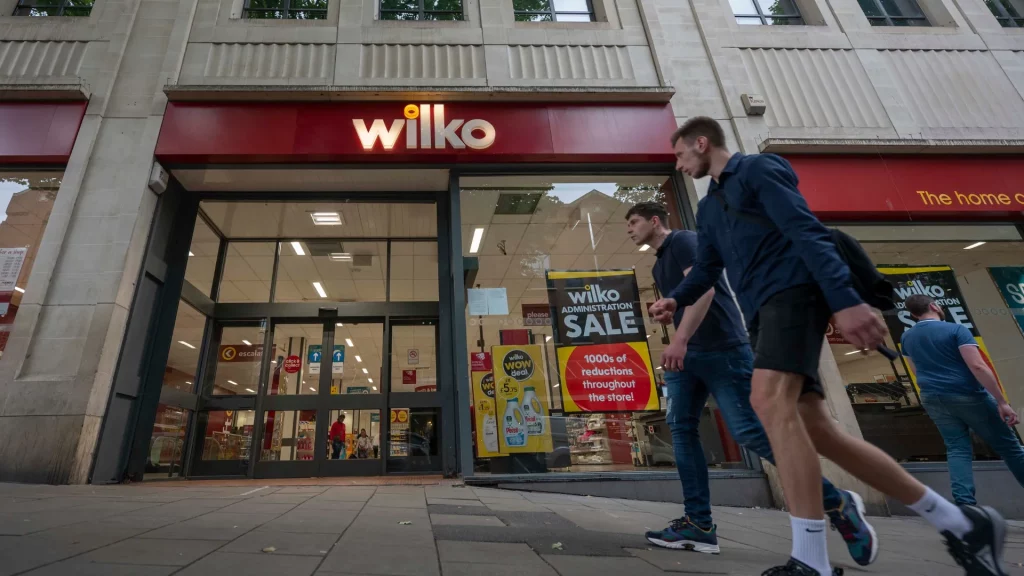The collapse of the rescue deal signifies that there are no bidders currently interested in running the stores under Wilko’s name
In a significant change in the UK high Streets, the iconic Wilko, the popular retail chain, is set to vanish marking the end of an era for the popular family-owned chain. After a rescue deal for the struggling business failed, it was announced that all 400 Wilko stores across the UK would cease operations by early October. This development brought uncertainty about the fate of the company’s 12,500 employees.
The collapse of the rescue deal signifies that there are no bidders currently interested in running the stores under Wilko’s name. However, some parties have expressed interest in rebranding the stores, but this again leaves the future of the retail firm’s staff in question.
One of the potential saviours of Wilko was Doug Putman, the billionaire owner of HMV. Putman had ambitious plans to keep nearly 300 Wilko shops open. Unfortunately, his bid hit roadblocks due to rising costs, complicating the deal’s execution.
This week will mark the beginning of the end for Wilko stores, with the closure of the first batch of locations. Administrators PwC had previously announced that 52 stores across the country would cease trading on specific dates in September. The remaining 124 stores are slated to close between September 17th and 21st, affecting locations such as Bognor Regis, Maidenhead, and Humberstone in Leicestershire.
This news will be hard on the employees and customers, but it was quite expected. The retail business dynamics in the United Kingdom have undergone significant changes in recent years, with several competitive firms like Poundland, The Range, B&M, and Home Bargains rising. The cost of living crisis has also had its fair share in urging customers to seek out bargains, favouring stores that offer competitive prices.
B&M, a major competitor, has expressed its intention to take over up to 51 of Wilko’s 400 stores in a deal worth £13 million. Even if it is predictable that these stores will be rebranded as B&M outlets, the fate of the existing retail firm’s employees and whether they will be given preference while applying for positions at the rebranded stores remain uncertain.
One significant factor contributing to Wilko’s challenges is its store locations. Most of the Wilko shops are situated in high Street locations within traditional town centers. Now these locations were convenient for shoppers without cars earlier, but there has been a greater shift toward larger retail parks and other options since the pandemic. This shift has benefitted the rivals.
Poundland is also considering purchasing up to 70 Wilko stores as a means of bolstering its own portfolio. Poundland and B&M, like Wilko, cater to budget-conscious shoppers and have successfully attracted customers seeking value for money.
Although the retail brand will be fading from the UK’s landscape, it is not completely going away. Several retailers including The Range have proposed bids for the Wilko brand itself, potentially keeping the name alive.
For the employees, the uncertainty surrounding their future is taking a toll. Many have expressed frustration at the lack of official information provided by the company regarding the fate of their stores. The situation has created immense stress among the workforce, with some feeling let down by both the union and Wilko.
The retail firm’s financial struggles became apparent when it announced in August that it had entered administration. This move raised concerns about the job security of its 12,500 employees. As of now, 1016 job cuts have been announced for stores that are closing. An additional layoff of 299 has occurred at Wilko’s distribution centers. Canadian entrepreneur Doug Putman, known for his successful rescue of HMV, attempted to save Wilko but faced many challenges. His initial plan involved acquiring 300 stores, but the deal in its most recent form might have included around 100.
Wilko, which had been family-run until recent struggles came to light, stepped up to fill a gap in the UK High Streets after the collapse of Woolworths in 2008. The store was founded in 1930 and was renowned for for affordable everyday items. The retail chain faced sharp losses and a cash shortage leading to its current status.
